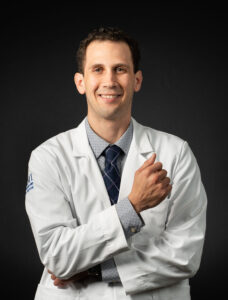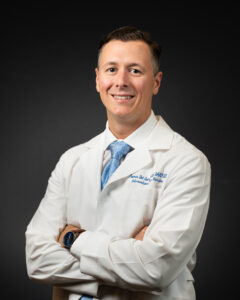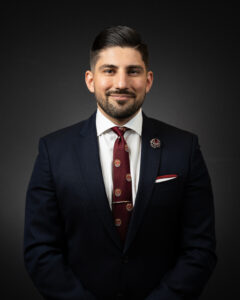Disc Herniation Treatment for Patients in Freehold New Jersey
Reviewed by AOSMI’s Fellowship Trained, Orthopedic Spine Surgeon, Dr. Justin Elkrief.
Have you noticed pain and stiffness in your lower back, arms, or legs? If so, these can be common symptoms of at herniated disc. Disc herniation occurs when the soft center of a spinal disc pushes through a tear in the hard exterior of the disc. This herniated, or ruptured, disc can irritate the nerves, causing the aforementioned pain.
If you are experiencing neck or back pain, then the spine specialists at Advanced Orthopedics and Sports Medicine Institute (AOSMI) in New Jersey may be able to help you find relief. Our team of board-certified New Jersey spine surgeons and other medical professionals will provide an assessment to identify whether a herniated disc is the source of your pain, then devise the best treatment plan for your condition. Your treatment plan could include such services as physical therapy and pain management, which are among the services offered at our state-of-the-art center in New Jersey, affording you the ability to receive all of the treatment that you require at a single clinic.
WHAT CAUSES A HERNIATED DISC?
Disc herniation is often a result of the natural aging process. Disc degeneration occurs as you age, and your spine loses water content. This can make a disc less flexible and prone to rupturing even with the slightest twist. However, some actions can make you more susceptible to disc herniation, including:
- Using your back muscles instead of your legs to lift
- Sustaining a fall or blow to the neck or back
- Gaining excessive weight
- Engaging in a physically demanding job
How Does AOSMI Treat Disc Herniation?
There is no singular way to treat a herniated disc. Here at AOSMI in New Jersey we recognize that each case is different, and we provide treatment based on an individual’s needs. Our orthopedic spine surgeons emphasize conservative therapies, such as physical therapy, whenever possible. But, if the pain and discomfort only worsen over time, especially after several weeks of conservative treatment, then herniated disc surgery may be needed. If that is the case, our team here at AOSMI can devise a surgical plan to address your issues using advanced, minimally invasive techniques to allow for a faster recovery.
Contact AOSMI today to learn more about our facility and the treatment options we offer for disc herniation.
Frequently Asked Questions about Herniated Discs
What are common symptoms of a herniated disc?
Can a herniated disc heal on its own?
What happens if you don’t fix a herniated disc?
How long does it take for a herniated disc to heal?
What are common treatments for disc herniation?
Frequently Asked Questions about Herniated Discs
What are common symptoms of a herniated disc?
Common symptoms of a herniated disc can include localized or radiating pain, numbness, tingling, or weakness in the area served by the affected nerve. Depending on the location of the herniation, you may experience back pain, leg pain (sciatica), arm pain, or other neurological symptoms. Bowel or bladder dysfunction is rare but may occur if the herniated disc is compressing nerves severely.
Can a herniated disc heal on its own?
In many cases, a herniated disc can heal on its own with proper care and time. The body’s natural healing processes can lead to a reduction in inflammation and resorption of the herniated disc material. However, the healing process varies for each individual and depends on factors such as the severity of the herniation, the location, and the body’s response. Medical guidance and conservative treatments are often recommended to support natural healing.
What happens if you don’t fix a herniated disc?
If a herniated disc is not properly managed, it can potentially lead to ongoing pain, discomfort, and functional limitations. In some cases, the herniation may worsen or result in nerve compression, causing more severe symptoms. Chronic compression of nerves can lead to long-term neurological deficits and may require more extensive interventions if left untreated.
How long does it take for a herniated disc to heal?
The healing time for a herniated disc can vary widely based on factors such as the individual’s overall health, the severity of the herniation, and the chosen treatment approach. Mild cases might start to show improvement within a few weeks, while more complex cases may require several months for noticeable healing. It’s important to follow medical advice and treatment recommendations to optimize the healing process.
What are common treatments for disc herniation?
Common treatments for disc herniation include:
1. Conservative Management: Rest, activity modification, and pain medications to manage symptoms while allowing the body to heal naturally.
2. Physical Therapy: Targeted exercises to strengthen muscles, improve flexibility, and support the spine.
3. Medications: Nonsteroidal anti-inflammatory drugs (NSAIDs), muscle relaxants, and pain relievers to alleviate discomfort and reduce inflammation.
4. Epidural Steroid Injections: Injections of corticosteroids near the affected nerve can provide temporary pain relief and reduce inflammation.
5. Surgical Interventions: In cases where conservative measures are ineffective or severe neurological deficits exist, surgical options like discectomy, laminectomy, or minimally invasive procedures may be considered.
Find your Provider










